-

新人教版高中英语必修3Unit 5 The Value of Money-Listening &Speaking&Talking教学设计
4. A:We’d like to have someone to say a word at the beginning to welcome the group.B:↙Who?A:We thought that you or Dr.Johnson might do it.B用降调说Who,其意思是问,对方想让谁在开场时致欢迎词。Step 6 Pronunciation---Practice1. Listen to the short conversation and mark the intonation with ↗, ↙ or ↙, ↗. Then discuss with a partner what they intend to convey by using different intonation.Owner: You know what ?↗ It’s a million-pound bank note↙.Waiter 1: Really ?↗(question)Waiter 2: Really !↙(unbelievable and surprised)Waiter 3: Really ?!↙↗(first question then surprised)2. Listen to the conversations. Underline the parts that are stressed and mark the intonation. Then talk about the implied meanings of the responses with different intonations. Listen again and repeat.1) Henry: It’s a nice suit.Owner: Oh, it’s perfect!↙(The intonation means it is very suitable for Henry.)2) Henry: Well, that’s very kind of you.Owner: Kind, sir ?↗(what you said is not right) No, it’s kind of you. You must come whenever you want and have whatever you like. Just having you sit here is a great honour !!↙(welcome you to come again)3)Henry:Well, to be honest, I have none. Oliver:(happily) What luck!(excited) Brother↗, what luck!↙(It means “Didn’t you hear it?”)Henry: Well, it may seem lucky to you but not to me!↗(angry) If this is your idea of some kind of joke, I don’t think it’s very funny. Now if you’ll excuse me, I ought to be on my way.↙(If so, I would leave.)Roderick: Please don’t go↙...(hope Henry can wait for a moment)Part B Viewing and Talking---Describe people’s changing attitudes in a film clipStep 1 Before-listening---Tell the filmYou are going to watch part of the film The Million Pound Bank Note. Look at these photos and guess what happens in the film.

新人教版高中英语必修3Unit 5 The Value of Money-Listening &Speaking教学设计
Step 4: Listen again and decide if the following statements are true (T) or false (F).1 It was the first time Chen Liyan's story was reported. T口 F口2 Chen found 10,000 yuan in a small plastic bag in Taiyuan railway station口 F口3 Wang Zheng apologized to Chen because he couldn't offer her more money. T口 F口4 Chen took out a large loan to cure her daughter, T口 F口5 Wang set up a fundraising website for Chen's daughter after Chen told him about her situation. T口 F口Step 5:After listening, discuss the questions.1 What kind of person do you think Chen Liyan is?Chen Liyan is generous and honest because she returned a large sum of money to the owner.2 Did Chen return the money because she didn't need it?No. She returned the money because it was the right thing to do. Evidence for this is that she refused to accept the reward money because she felt that it had not been earned. 3 Is it common for people to do what Chen did?It depends on the culture. In some countries it is quite common to return money that has been found. In other countries, people believe "Finders are keepers!" 4 How did Wang Zheng feel about the return of his money?He must have been very happy and relieved to have gotten his money back. We know this because he thanked Chen repeatedly and even offered her a reward.5 Why did Ma Dongbao tell Wang about Chen's family?He must have had great sympathy for Chen and her daughter and wanted to help them.'We know this because he arranged help for them. 6 How did the news reporter feel about Chen's actions?The news reporter felt that it showed that money wasn't the most important thing in life. We know this because the reporter told us that this is what Chen believes. and then said, “that's a great attitude to take."

新人教版高中英语必修3Unit 5 The Value of Money-Reading and Thinking教学设计一
Everybody wants to get wealth.In today’s material world,making money or becoming wealthy symbolizes a person’s success and capability. Many people just make every effort, pay any price to attain greater wealth. With money,they can buy nice, large apartments in nice neighborhood. With money they can own luxurious cars. Wealth seems to bring all happiness in life.But is wealth the only road to happiness? Not really. There are many things in the world, which are beyond the means of money, such as friendship, love, health and knowledge. People are so preoccupied with struggling for money that they have no time or would not take the time to form or maintain friendship. What happiness can they feel living as lonely miserable creatures without love or friends in the world even if they accumulate tremendous wealth?In my opinion, people can’t do anything without money, but money is not everything. What money will bring you depends on your personal belief and goal in life. If you are kind enough to help others, especially the poor, money is a good thing to you. With it, you can do much more for the benefit of people and your country, and it will add to your own happiness. If you want money just for your own needs, you’ll never be satisfied or happy. In a word,you should have money spent for more people. Only then can money be the source of your happiness.Step 8 Homework4 students in a group, one acts Roderick, one Oliver, one servant and the fourth one acts Henry Adams, then listen to the tape, pay more attention to the difference between American English and British English in pronunciation, stress, tone.

新人教版高中英语必修3Unit 5 The Value of Money-Reading for Writing教学设计二
2. 您能看到, 我头发太长了。You can see that my hair is much too long.3. 无论什么时候, 只要您想回来就回来。Please come back whenever you want.4. 您仅有很少的头发要理! You only have too little hair to cut !5. 为您服务是我的荣幸!It is my honour to serve you!Step 9 Writing(Henry is walking down the street when he sees a sign for a place that cuts hair. He decides to have it cut. )H=Henry B=BarberH: Good afternoon, I’d like to have my hair cut, if I may. (The barber looks at Henry’s hair and continues cutting another man’s hair. ) Er, I’d really like a haircut. As you can see it’s much too long. B: (in a rude manner) Yes, I can see that. Indeed, I can. H: Fine, well, I’ll have a seat then. (He sits in one of the barber’s chairs. The barber turns to look at Henry. )B: It’s quite expensive here, you know! Are you sure you can afford it?H: Yes. I think so. (After his hair is cut, the barber tells Henry how much he must pay. Henry shows the barber the bank note. )B: Why Mr. . . (looks shocked)H: Adams. Henry Adams. I’m sorry. I don’t have any change. B: Please don’t worry! (wearing a big smile) Nothing to worry about! Nothing at all! Please come back whenever you want, even if you only have too little hair to cut! It will be my honour to serve you!Step 10 Pair workExchange drafts with a partner. Use this checklist to help your partner revise his/her draft.1. Are all the elements of a play included and in good order ?2. Do the character use suitable language ?3. Are the stage directions clear and useful ?4. Is the plot clear and exciting enough ?

新人教版高中英语必修3Unit 5 the value of money-Reading For Writing教学设计一
【参考范文】Narrator:(Henry is smiling as he leaves the restaurant. As he is walking down the street, he sees a sign for a place that cuts hair. He decides to get it cut. )H=Henry;B=Barber;R=rude manH:Good afternoon, I'd like to get a cut, if I may. (The barber looks at Henry's hair and continues cutting another man's hair. )Er, I'd really like a haircut. As you can see it's much too long. B:(in a rude manner) Yes, I can see that. Indeed, I can. H:Fine, well I'll have a seat then. (He sits in one of the barber's chairs. The barber turns to look at Henry. )B:It's quite expensive here, you know!Are you sure you can afford it?H:Yes. I think so. (In comes the rude man. )R:Hey you there. I need a haircut quickly. Can you do me straightaway?B:All right, then, get in the chair and I'll see what I can do. R:Thank you. (sits down in one of the barber's chairs)H:Excuse me, but I was here first. Aren't you going to do my hair first?B:This man's in a hurry. H:Well so am I!I insist that you cut my hair first. B:OK, but I'll have to be quick. This gentleman is waiting. H:Thank you. (They both become quiet. After his hair is cut, the barber tells Henry how much he must pay. Henry shows the barber the bank note. )B:Why, Mr . . . (looks shocked)H:Adams. Henry Adams. I'm sorry, I don't have any change. R:You're that Mr Adams! Well,I'm glad I waited or I might never have known it was you. B:Why, Mr Adams, please don't worry!(wearing a big smile) Nothing to worry about!Nothing at all!Please come back any time, even if you only need too little hairs cut!It will be my honour to serve you!

新人教版高中英语选修2Unit 1 Science and Scientists-Discovering useful structures教学设计
The grammatical structure of this unit is predicative clause. Like object clause and subject clause, predicative clause is one of Nominal Clauses. The leading words of predicative clauses are that, what, how, what, where, as if, because, etc.The design of teaching activities aims to guide students to perceive the structural features of predicative clauses and think about their ideographic functions. Beyond that, students should be guided to use this grammar in the context apporpriately and flexibly.1. Enable the Ss to master the usage of the predicative clauses in this unit.2. Enable the Ss to use the predicative patterns flexibly.3. Train the Ss to apply some skills by doing the relevant exercises.1.Guide students to perceive the structural features of predicative clauses and think about their ideographic functions.2.Strengthen students' ability of using predicative clauses in context, but also cultivate their ability of text analysis and logical reasoning competence.Step1: Underline all the examples in the reading passage, where noun clauses are used as the predicative. Then state their meaning and functions.1) One theory was that bad air caused the disease.2) Another theory was that cholera was caused by an infection from germs in food or water.3) The truth was that the water from the Broad Street had been infected by waste.Sum up the rules of grammar:1. 以上黑体部分在句中作表语。2. 句1、2、3中的that在从句中不作成分,只起连接作用。 Step2: Review the basic components of predicative clauses1.Definition

新人教版高中英语选修2Unit 4 Journey Across a Vast Land教学设计
当孩子们由父母陪同时,他们才被允许进入这个运动场。3.过去分词(短语)作状语时的几种特殊情况(1)过去分词(短语)在句中作时间、条件、原因、让步状语时,相当于对应的时间、条件、原因及让步状语从句。Seen from the top of the mountain (=When it is seen from the top of the mountain), the whole town looks more beautiful.从山顶上看,整个城市看起来更美了。Given ten more minutes (=If we are given ten more minutes), we will finish the work perfectly.如果多给十分钟,我们会完美地完成这项工作。Greatly touched by his words (=Because she was greatly touched by his words), she was full of tears.由于被他的话深深地感动,她满眼泪花。Warned of the storm (=Though they were warned of the storm), the farmers were still working on the farm.尽管被警告了风暴的到来,但农民们仍在农场干活。(2)过去分词(短语)在句中作伴随、方式等状语时,可改为句子的并列谓语或改为并列分句。The teacher came into the room, followed by two students (=and was followed by two students).后面跟着两个学生,老师走进了房间。He spent the whole afternoon, accompanied by his mom(=and was accompanied by his mom).他由母亲陪着度过了一整个下午。

新人教版高中英语选修2Unit 1 Science and Scientists-Reading and thinking教学设计
Step 5: After learning the text, discuss with your peers about the following questions:1.John Snow believed Idea 2 was right. How did he finally prove it?2. Do you think John Snow would have solved this problem without the map?3. Cholera is a 19th century disease. What disease do you think is similar to cholera today?SARS and Covid-19 because they are both deadly and fatally infectious, have an unknown cause and need serious public health care to solve them urgently.keys:1. John Snow finally proved his idea because he found an outbreak that was clearly related to cholera, collected information and was able to tie cases outside the area to the polluted water.2. No. The map helped John Snow organize his ideas. He was able to identify those households that had had many deaths and check their water-drinking habits. He identified those houses that had had no deaths and surveyed their drinking habits. The evidence clearly pointed to the polluted water being the cause.3. SARS and Covid-19 because they are both deadly and fatally infectious, have an unknown cause and need serious public health care to solve them urgently.Step 6: Consolidate what you have learned by filling in the blanks:John Snow was a well-known _1___ in London in the _2__ century. He wanted to find the _3_____ of cholera in order to help people ___4_____ it. In 1854 when a cholera __5__ London, he began to gather information. He ___6__ on a map ___7___ all the dead people had lived and he found that many people who had ___8____ (drink) the dirty water from the __9____ died. So he decided that the polluted water ___10____ cholera. He suggested that the ___11__ of all water supplies should be _12______ and new methods of dealing with ____13___ water be found. Finally, “King Cholera” was __14_____.Keys: 1. doctor 2. 19th 3.cause 4.infected with 5.hit 6.marked 7.where 8.drunk 9.pump 10.carried 11.source 12.examined 13.polluted 14.defeatedHomework: Retell the text after class and preview its language points

新人教版高中英语选修2Unit 2 Bridging Cultures-Discovering useful structures教学设计
The grammar of this unit is designed to review noun clauses. Sentences that use nouns in a sentence are called noun clauses. Nominal clauses can act as subject, object, predicate, appositive and other components in compound sentences. According to the above-mentioned different grammatical functions, nominal clauses are divided into subject clause, object clause, predicate clause and appositive clause. In this unit, we will review the three kinds of nominal clauses. Appositive clauses are not required to be mastered in the optional compulsory stage, so they are not involved.1. Guide the students to judge the compound sentences and determine the composition of the clauses in the sentence.2. Instruct students to try to learn grammar by generalizing grammar rules, controlling written practice, and semi-open oral output.3. Inspire the students to systematize the function and usage of noun clause1.Instruct students to try to learn grammar by generalizing grammar rules, controlling written practice, and semi-open oral output.2.Inspire the students to systematize the function and usage of noun clauseStep1: The teacher ask studetns to find out more nominal clauses from the reading passage and udnerline the nominal clauses.

新人教版高中英语选修2Unit 3 Food and Culture-Discovering useful structures教学设计
The newspaper reported more than 100 people had been killed in the thunderstorm.报纸报道说有一百多人在暴风雨中丧生。(2)before、when、by the time、until、after、once等引导的时间状语从句的谓语是一般过去时,以及by、before后面接过去的时间时,主句动作发生在从句的动作或过去的时间之前且表示被动时,要用过去完成时的被动语态。By the time my brother was 10, he had been sent to Italy.我弟弟10岁前就已经被送到意大利了。Tons of rice had been produced by the end of last month. 到上月底已生产了好几吨大米。(3) It was the first/second/last ... time that ...句中that引导的定语从句中,主语与谓语构成被动关系时,要用过去完成时的被动语态。It was the first time that I had seen the night fact to face in one and a half years. 这是我一年半以来第一次亲眼目睹夜晚的景色。(4)在虚拟语气中,条件句表示与过去事实相反,且主语与谓语构成被动关系时,要用过去完成时的被动语态。If I had been instructed by him earlier, I would have finished the task.如果我早一点得到他的指示,我早就完成这项任务了。If I had hurried, I wouldn't have missed the train.如果我快点的话,我就不会误了火车。If you had been at the party, you would have met him. 如果你去了晚会,你就会见到他的。
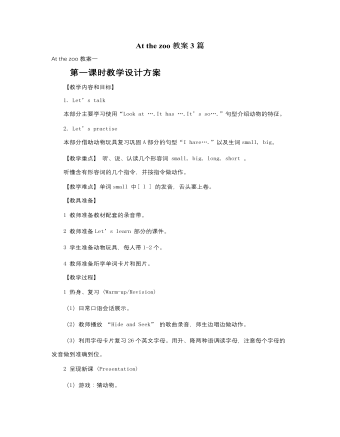
人教版新课标PEP小学英语三年级下册At the zoo教案3篇
(二) 呈现新课 (Presentation)1、教师出示学过的缩略语PRCUKCANUSA让孩子读一读,然后拿出相应的卡片贴在黑板上请掌握较好的学生带着同学们读一读缩略语2、出示课文中的缩略语,让孩子们自己试着读一读,然后试着说说缩略语的含义3、听录音,跟读。小组说说4、让孩子们介绍自己收集的生活中的缩略语教师给以适当的扩充:CCTVWTOUFO等5、教师分别出示大小写Hh,让孩子想想大小写的字母分别想什么,用语言描述或是用动作表示。6、Let’s chant听录音,边听边打节奏听录音,边听边出示相应的字母听录音,边听边试着说歌谣孩子们带上自己的头饰,在小组中边演边说各小组展示(三)趣味操练(Practice)1、listen and order the cards让孩子说字母,按照听到的顺序排列字母2、listen and guess教师拼一拼缩略语,孩子快速说出词小组游戏(四) 扩展性活动(Add-activities)纸牌游戏两个孩子分别有一套学过的字母卡,按顺序出卡片,看谁能最先组成一个学过的缩略语。【板书设计】
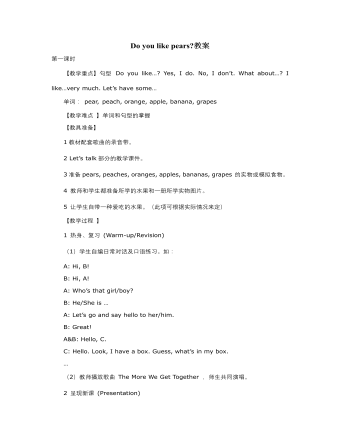
人教版新课标PEP小学英语三年级下册Do you like pears教案
教师扮做客人,让孩子根据问题做出反应并回答。 Can I have an apple? Can I have some grapes? Let’s sing 播放歌曲的录像,先观看一遍, 帮助孩子理解歌曲。 孩子边唱边表演。 小组表演,小组展示。 (四) 扩展性活动(Add-activities) Coloring Draw some grapes, color them red Draw a banana,color it green. …, …【板书设计 】Do you like pears? Do you like pears? 第五课时第六课时【课题】Do you like pears? 第六课时 【教学重点】听、说、认读字母Rr Ss Tt,体会字母在单词中的发音 【教学难点 】字母Ss的发音。Tiger中字母I的发音 【教具准备】 1、本课生词的单词卡片 2、配套的教学课件 3、相配套的教学录音带 4、学生的小英语练习本 5、大字母卡片,每组一套的小字母卡片 【教学过程 】 (一)热身/复习(Warm-up/Revision) 1、Let’s sing 演唱B部分的歌曲,边唱边演。
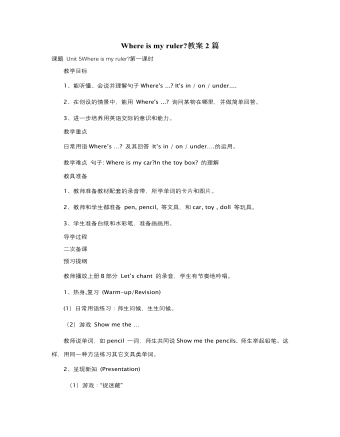
人教版新课标PEP小学英语三年级下册Where is my ruler教案2篇
1.Let’s say学习字母Uu, Vv, Ww,以及以这些字母开头的单词。2.Let’s do本部分通过有韵律的歌谣,来复习巩固A-W的字母。【教学重点】学习字母Uu, Vv, Ww及以其为首字母的单词【教学难点】单词umbrella, violin, wind和字母Uu, Vv, Ww的发音.【教具准备】1 教师准备教材配套的录音带。2 教师准备 umbrella, vest, violin, window, wind 的图片和词卡。3 教师准备字母卡 Aa----Ww 。【教学过程】1 热身、复习 (Warm-up/Revision)(1)Oral practice学生口语会话展示。教师可根据学生情况提示他们增加对内容。(2)游戏:“猜猜看”。教师用简笔画的方法在黑板上画某种交通工具的某个部位,边画边问:What is it? 学生随意想象,猜图说:A panda? A jeep? A pear? … 教师再继续画一两笔,让学生接着猜,并以小组为单位讨论,最后由一名学生代表说出一个答案。教师将图画完,带领学生一起说: Look! It’s a … 猜对的小组赢得一分。(以交通工具、玩具和文具词为主) 还可让学生代替教师进行此项活动。
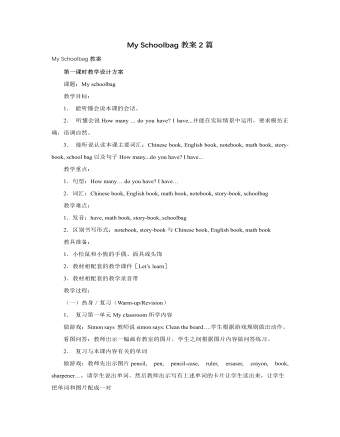
人教版新课标PEP小学英语四年级上册My Schoolbag教案2篇
教师问:Can you spell these words? 如有学生能够拼出单词,教师要给与表扬并说:那让我们来看一看他拼的对不对,然后出示单词卡。如没有学生拼出单词,教师说:我们学习单词不仅要会说还要会写,今天我们就来学习几个单词的拼写,看谁学得快。然后出示单词卡。 让学生看单词卡拼读单词。 教师让学生看单词回答:How many letters in this word?学生回答后,让他们背着拼出单词。 教师让学生在四线三格中默写字母b, o, k, r, l, e, p, n, c, I, a,教师教学生在四线三格中书写单词。告诉学生首先要把每个字母书写正确,然后按照单词的拼写把字母写在一起,注意单词的每个字母间要有一点距离。教师在教写ruler和pencil-case时, 注意小写u和s还没有学习书写,让学生照着板书写就可以了。 让学生照板书抄字头,然后每个单词写一行。 (三)趣味操练(Practice)
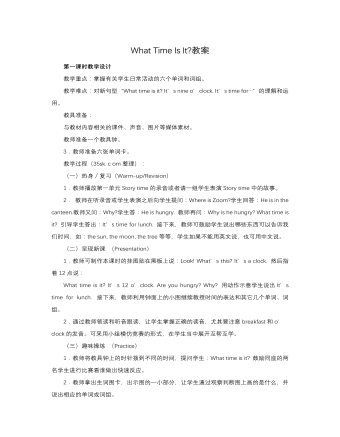
人教版新课标PEP小学英语四年级下册What Time Is It教案
2. 看图片或课件,回答理解性问题,并通过情景、动作等帮助学生理解hurry, ready 和oops的意义,可适当进行造句练习加以巩固,并注意对两个句型:“It’s time for ...”和“It’s time to ...”加以比较。听录音,然后跟读、模仿。分角色朗读和分角色表演。(三)趣味操练 (Practice)1.调查:设计一个调查表,然后调查五名学生或教师的作息时间,在四人小组中进行交流。鼓励学生用新句型“It’s time to ...”来表述。2.Let’s check教师连续播放三次录音。第一遍让学生先听录音,第二遍勾出与录音内容相符的一项,第三遍检查并核对答案。教师引导学生自我评价。(四)扩展性活动(Add-activities)1.做本单元B部分Let’s talk的活动手册配套练习。2.将本课时对话读给同伴、朋友或家长听。3.用英语向好朋友介绍自己的作息时间表。

人教版新课标PEP小学英语三年级下册How many说课稿7篇
我随意走动,观察学生们用英语交流的情况,有困难的适时指导一下。学生们在完成任务的过程中,积极运用语言,激发了学习兴趣,同时还实现了与数学学科的渗透和联系。在这节课的最后,我布置了一个有层次的作业,让学生自主选择:①听录音,仿读会话;②分角色表演会话;③改编会话,分角色表演并录成磁带。分层次的作业,让不同程度的学生都能有事可做,都有表现自己的机会,体验到成功的喜悦,同时使学生的语言交际向课外延伸,使他们能带着动力,保持兴趣继续学习。总之,在这节课的教学设计中,我重视对新知识的铺垫和自然导入,通过多种方式的呈现,让学生们自然而然地学习新知识。充分利用游戏、合作交流等教学手段,让学生们饶有兴趣地操练语言、运用语言,在完成任务过程中巩固知识,运用知识,体验成功的喜悦,培育积极的学习情感,形成良好的学习策略,并将这些积极的因素带人下一步的学习当中。

人教版新课标PEP小学英语三年级下册My family说课稿6篇
(1)单词:father (dad), mother (mom), grandfather (grandpa), grandmother (grandma), man, woman(2)学唱英语童谣《Father and Mother》。难点:表示家庭成员单词的认读三、说学情三年级第二学期的学生,能够认读少量简单的单词;但是由于英语不是我们的母语,在日常生活中少于应用,学生学得快,忘得也快,在口语交流能力方面很差。因此,在教学中要结合学生的实际情况,采取有效的教学方法进行教学。四、说教法根据教学内容的特点,我在教学中①注重主题化整体设计,以family为主线贯穿始终,结合远程教育资源的利用,给学生创设一个轻松、愉快的学习氛围。②注重在课堂教学中充分体现“以学生为主体”的教学原则,营造“真实性”的语言环境和开放的空间,让学生在交际中学习运用。③在教学过程中设计各种教学活动,让他们在唱中学,在做中学,在玩中学,从而充分调动其学习兴趣,同时还注重培养学生各项能力训练。五、说学法
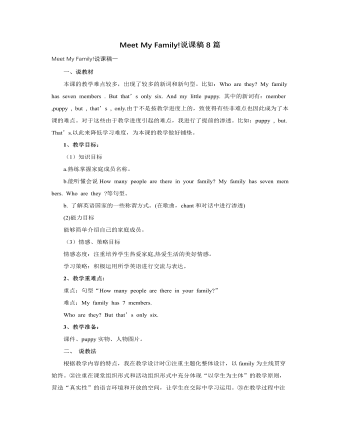
人教版新课标PEP小学英语四年级上册Meet My Family!说课稿8篇
一、说教材:我所上的是PEP3 Unit6 Meet my family B Let’s talk 部分。主要的学习内容是:1.What’s your mother/father? He’s/She’s a …. 2. He looks strong. They look young. 3.Is this your …?Yes, he/she is. No, he/she isn’t. 同时,在完成教学大纲所规定的教学内容后,根据学生的掌握情况,在学有余力的情况下,适当拓展学习内容,让学生结合自己的家庭照片,把自己的家人介绍给自己的朋友。二、说教学目标:1.能听懂、会说本课对话,并能在实际情景中运用。2.能听、说、认读本课句型Is this your father ? What’s your mother ? He looks strong .They look young .3.理解、会说Let’s chant部分的内容。三、说重点:1.能听、说、认读句型:Is this your …?What’s your …?He looks ….四、说难点:1.能够正确认读句型:They look young. Are they farmers.五、说教学过程:一、热身复习。1.Let’s doAct like a teacher/baseball player/driver/doctor/farmer/nurse.(课前播放Let’s do 部分的音乐,让学生进入教室跟着音乐边说边做。既起到了复习上节课所学单词的作用,又为新的引出奠定了基础。)
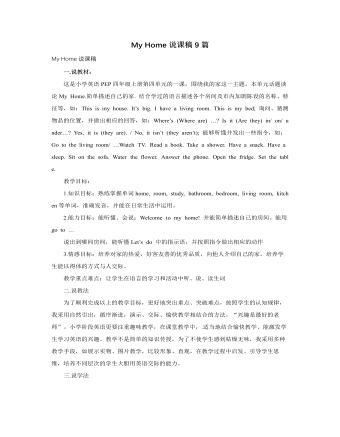
人教版新课标PEP小学英语四年级上册My Home说课稿9篇
1、教师出示Let’s learn的课件(教材配套),提问“What can you see in the picture?”鼓励学生们积极发言,尽量说。2、学生会说到TV. table. chair desk甚至bed 等词。如果学生说出本课的生词,教师要特别鼓励,并反复的读几遍,加深学生的印象。如果学生指着table说成了desk, 教师可通过图片对比两个单词的不同。3、针对学生第2项说的情况进行生词的学习:教师图片出示phone等图,教学生一一学说生词,每个生词示范读后,都请大部分学生试读。注意phone的尾音。4、教师播放课件,学生跟读学习。5、游戏:将本课时的单词上下左右贴在黑板上,播放录音,学生听一听,指一指。再次打乱图片顺序,学生根据录音指图片。教师还可请能力强的学生说单词,其他学生指图片。6、让学生听录音,跟读Let’s learn中生词。然后教师随意说词,学生快速的指出。
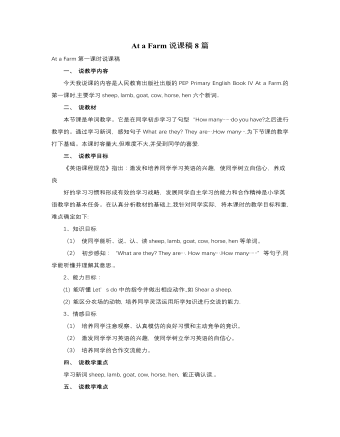
人教版新课标PEP小学英语四年级下册At a Farm说课稿8篇
一、说教材《At a Farm》是义务教育课程标准实验教科书英语(PEP)四年级下册的内容。本课要求在理解课文的基础上掌握五个动物的单词“cat, rabbit, pig, duck, dog”和两个句子“Are they ducks? No, they aren’t.”本节课是四年级下册第六单元第三课时。本单元重点学习农场上常见的牲畜和蔬菜名称以及包含名词复数的一般疑问句,而学生在学习了前两课时之后,排除了句型上的困难,而且这五个单词在以前的学习中也见到过,所以要把单词和句型的规范书写放在首位,打牢基础,还要培养学生在理解课文基础上朗读课文的能力。我确定了三个教学目标。1、能够听、说、读、写“cat, rabbit, duck, pig, dog”这五个动物单词以及句子“Are they ducks? No, they aren’t.”2、能够理解并试唱Let’s chant部分的歌谣。3、能够总结五个元音字母的发间规律。重点:掌握五个动物名词以及句型的拼写。难点:准确朗读课文和五个元音字母的发音规律。